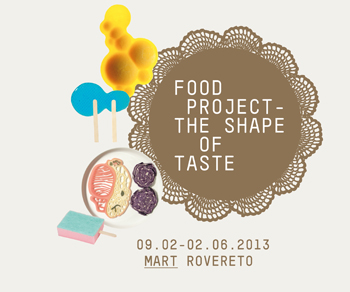The Food Project. The Shape of Taste.
9 February–2 June 2013
Mart Rovereto
Corso Bettini 43
38068 Rovereto
In recent years, the debate about food in the world of design has attained unheard-of levels of public interest. And the world of design, which always records and often anticipates aesthetic and cultural trends, together with socio-economic and anthropological ones, has in turn dedicated close attention to the world of food, showing creativity, curiosity and great innovative capacity.
The creations of a large group of “food designers” are at the centre of The Food Project. The shape of taste exhibition, with which the Mart, Museo di arte moderna e contemporanea di Trento e Rovereto presents the art of industrial projects and experimental design applied to foods.
Curated by Beppe Finessi, the exhibition runs from 9th February to 2nd June 2013.
It sees the participation of such designers and architects as Enrico Azzimonti, Bompas&Parr, Achille Castiglioni, Stephan Bureaux, Lorenzo Damiani, Florence Doleac, FormaFantasma, Giorgetto Giugiaro, Marije Vogelzang, Marti Guixé, Giulio Iachetti, Marcel Wanders, Enzo Mari, Alessandro Mendini, Katja Grujters, Konstantin Grcic, Gaetano Pesce, Diego Ramos, Philippe Starck and leading chefsi, like Gualtiero Marchesi, together with Bruno Barbieri, Massimo Bottura, Antonio Canavacciuolo, Carlo Cracco, Daniel Facen, Davide Oldani and Davide Scabin.
The exhibition is divided into a number of thematic areas and opens with a tribute to the “Good Design” book written by Bruno Munari 50 years ago, in which the great maestro taught his readers to read the products of nature, like oranges, as though they were objects of design, stressing their “functional and performance” characteristics with irony and precision.
Starting with this lesson, the exhibition reveals some “anonymous foods” through a series of graphic interpretations, to reveal their traditional forms in their sophisticated and precise architectural connotations: because behind such geographically connoted foods—like sushi or strudel, but also lasagne or arancino—is frequently concealed a planning approach that is the result of a careful compromise between image, taste and production. A basic and omnipresent food—bread—is presented in a series of different forms, displayed like sculptures to stress their aesthetic “fineness.”
Various types of pasta, designed by such as Giorgetto Giugiaro, Mauro Olivieri and Christian Ragot, emblematically show how the creativity of designers converges with industrial production; this is one of the key themes of the exhibition. As Giampiero Bosoni writes in the catalogue, it has “revolutionised the relationship between form and content in food”. A felicity of synthesis that also underlies the success of commercial products, like Baci Perugina chocolates, Ferrero Rocher, Krumiro biscuits and Saratoga Chips.
The reflection about the transformations implemented by the food industry, which is still undergoing a radical evolution, meets the subject of ethics, ecology and also—in a section dedicated to patents—the relationship between creativity and standardisation.
“Food designers” today have an almost infinite freedom to shape form and function. Objects like the “Edible pen” of Martì Guixè, the chocolate “Golosimetro” (“greediness metre”) of Paolo Ulian and “Sugar Spoon” of Marije Vogelzang are some of the results of their fantasy.
In many cases, it is the form of a product that is planned and developed as a decorative element: the exhibition displays the jellies of Bompas & Parr reproducing St Paul’s Cathedral in London, the “Bread Palette” (a palette-shaped toast) by Ryohei Yoshiyuki and Delphine Huguet’s “Speculoos,” a biscuit that adapts to the shape of the coffee cup. All objects containing a dash of irony that develops into an entertaining detached viewpoint in the creations of Matteo Ragni, Diego Ramos and Enrico Azzimonti, gathered together in a section entitled “Irony, metaphor and paradox.”
Also on show are some designer objects made from food: chocolate jewels by Barbara Uderzo, bread dinner services by FormaFantasma and the “Decafè” of Raúl Laurí Pla, winner of the Salone satellite 2012 in Milan. Alessandro Mendini’s “Cioccolator” (“Chocolator”)—a calculator in the form of a chocolate bar—and “Popsicles” by Putput—sponges shaped to resemble ice cubes—are instead unusual examples of designer objects alluding to food. A site-specific project made for the Mart by Martì Guixé, one of the new masters of design, reveals further expressive possibilities in a field that is so fundamental to our lives.
A busy programme of events involves chefs of international standing, who will hold a series of “Martcookings,” evening cooking shows in the exhibition rooms. A live tweeting service with the #martcooking hashtag is available for each show.



